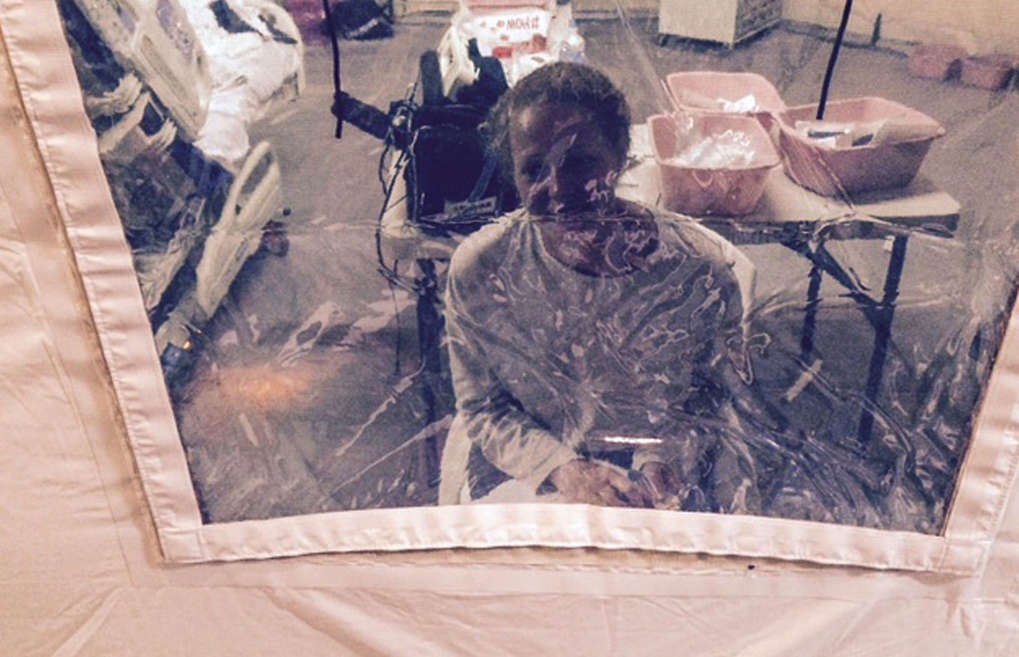
© Steve Hyman/Reuters Kaci Hickox speaks to her lawyer Norman Siegel from a hospital quarantine tent in Newark, New Jersey, October 26, 2014.
The U.S. military was isolating personnel returning from their mission to help West African countries curb Ebola even though they showed no sign of infection and a nurse who treated patients in Sierra Leone was released on Monday to go to her home state after New Jersey forced her into quarantine.
The decision by the Pentagon goes well beyond previously established military protocols and came just as the White House pushed to roll back steps by U.S. states to quarantine healthcare workers returning from the three countries at the center of the Ebola epidemic even if they were asymptomatic.
The U.S. Army has already isolated about a dozen soldiers at part of a U.S. base in Vicenza, Italy, including Major General Darryl Williams, who oversaw the initial response to the Ebola outbreak, the worst on record with nearly 5,000 dead.
Dozens more will be isolated in the coming days as they rotate out of West Africa, where the military has been building infrastructure to help health authorities treat Ebola victims, the Pentagon said.
Colonel Steve Warren, a Pentagon spokesman, said, “There was no single triggering event. This is really a decision that’s made out of an abundance of caution.”
The White House said the U.S. Centers for Disease Control and Prevention will release additional guidelines later on Monday governing protocols for healthcare workers returning to the United States after treating patients in West Africa.
With thousands already dead from Ebola in Liberia, Sierra Leone and Guinea, concerns are high in the United States and other countries about stopping its spread. But some state officials, grappling with an unfamiliar public health threat, have called federal restrictions placed on people traveling from Ebola-affected countries insufficient to protect Americans and have imposed tougher measures like automatic quarantines on returning medical workers.
The case of nurse Kaci Hickox, put into quarantine on Friday under a New Jersey policy that exceeded precautions adopted by the U.S. government, underscored the dilemma that federal and state officials are facing.
New Jersey Governor Chris Christie, who has defended his state’s policy of automatic quarantine for medical workers returning from treating patients in Liberia, Sierra Leone and Guinea, told reporters he did not reverse the policy in allowing her to be discharged from the hospital and to return to Maine.
“We’re very happy that she has been released from the hospital,” said Christie, who Hickox had criticized for making comments about her health that she said were untrue while calling her quarantine unjust.
“She hadn’t had any symptoms for 24 hours and she tested negative for Ebola so there’s no reason to keep her,” said Christie, a potential Republican Party 2016 U.S. presidential candidate known for his combative style.
Christie said he sees no reason to talk to Hickox and expressed “goodwill” toward her. “But she needs to understand that the obligation of elected officials is to protect the public health of all the people,” Christie said.
Christie said his state was providing transportation for her to Maine, whose health officials “will take over her care and monitoring from there” as she completes a 21-day quarantine at home. The quarantine matches the incubation period of the virus.
Maine Governor Paul LePage said his state will follow CDC guidelines for medical workers who have been in contact with Ebola patients.
Separately, a 5-year-old boy who arrived in the United States from Guinea has recorded a low-grade fever and will be tested for the virus in New York, city officials said. They said the results will be available later on Monday.
‘SUPPORTED, NOT STIGMATIZED’
U.N. Secretary-General Ban Ki-moon on Monday became the latest to criticize quarantines, saying through his spokesman these create difficulties for medical workers risking their lives in the battle against the deadly disease.
“Returning health workers are exceptional people who are giving of themselves for humanity,” said Ban’s spokesman, Stephane Dujarri. “They should not be subjected to restrictions that are not based on science. Those who develop infections should be supported, not stigmatized.”
President Barack Obama’s spokesman, Josh Earnest, made clear Monday that the White House was not thrilled that individual states had implemented quarantines viewed as unfair to returning healthcare workers, though he acknowledged the states’ rights to set them.
“We want to make sure that whatever policies are put in place in this country to protect the American public do not serve as a disincentive to doctors and nurses from this country volunteering to travel to West Africa to treat Ebola patients,” Earnest said.
Four people have been diagnosed with Ebola in the United States. The only patient now being treated for Ebola in the country is a New York doctor, Craig Spencer, who was diagnosed on Thursday. He had worked in Guinea treating Ebola patients with the humanitarian group Doctors Without Borders.
Medical professionals say Ebola is difficult to catch and is spread through direct contact with bodily fluids from an infected person and not transmitted by asymptomatic people.
Mandatory quarantine policies like those put in place on Friday by the governors of New York and New Jersey have been criticized by some health experts and federal officials amid concern the policies may discourage American doctors, nurses and others from traveling to West Africa to help in the fight against Ebola.
